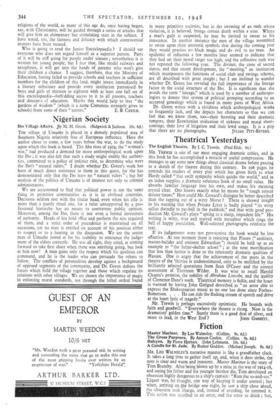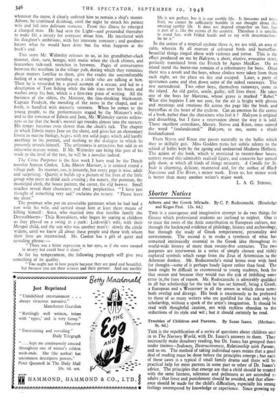Fiction
MR. LEO WALMSLEY'S narrative manner is like a grandfather clock. It takes a long time to gather itself up, and, when it does strike, the note is clear and warm and innocent. Master Mariner is the story of Tom Bransby. After being blown up by a mine in the war of 1914-18, and seeing his father and his younger brother die, Tom developed an obsession highly dangerous to a ship's captain: "Ram the so-and-sos." Liquor was, he thought, one way of keeping it under control ; but when, arriving on he bridge one night, he saw a ship- close ahead, the obsession took charge, and, instead of avoiding, he rammed it. This action was ascribed to an error, and the error to drink ; but,
whatever the cause, it clearly unfitted him to.remain a ship's master. Ashore, he continued chinking, until the night he struck his patient wife and fell into delirium tremens. From this illness he emerged changed man. He had seen the Light—and proceeded thereafter to make life a misery for everyone about him. He interfered with his daughter's ambitions, with her innocent romance • and goodness knows what he would have done but for what happens at the bock's end.
This story Mr. Walmsley releases to us, in his grandfather-clock manner, slow, sure, benign, with music when the clock chimes, and featureless tick-tock stretches in between. Pages of conversation between the worthies in the village pub, during which they reminisce about matters familiar to them, give the reader the uncomfortable feeling of a stranger intruding on a circle who are talking at him. Then he is rewarded by a grand account of a rescue, and led to a description of Tom fishing while the tide rises over his boots and washes away his bait, which is a first-rate piece of writing. All the business of the elders, the Minister, the free-thinking blacksmith. Captain Fosdyck, the mending of the. stove in the chapel, and so forth, is handled with masterly sureness. When he comes to the young people, to the performances staged- by- the Minister's wife, and to the romance of Edwin and Jane, Mr. Walmsley carries artless- ness so far that the book's mental age recedes almost into the nursery. His tempo becomes even slower than the clock's tick. The chapter in which Edwin meets Jane on the shore, and gives her an elementary lesson in marine biology, begins with ten solid pages which add hardly anything to his portrait, and nothing to the dialogue in which he presently reveals himself. The artlessneSs is attractive, but odd in an otherwise mature writer. If Mr. Walmsley can bring this part of his work to the level of the 'rest, he will be a novelist indeed.
The Cross Purposes is the first work I have read by the Dutch novelist Antoon Coolen. Like Master Mariner, it is centred round a village pub. Its manner, too, is leisurely, but every page is wise, adult and surprising. Quietly it builds up a picture of the lives of the little group who meet to drink each evening ; the notary, the postman, the municipal clerk, the house painter, the carter, the old brewer. gmall touches reveal their characters and their perplexities. " I have just thought of something very sad," exclaims the notary. " Please leave Me alone."
The postman who put on unsuitable garments when he had had a row with his wife, and carried about him at least three means of killing himself : Anna, who married into that. terrible family the Deysselbloetns: Thijs Rooyakkers, who began by staring at children as they played on a swing in a park : Lodewijk's wife, with their Mongol child, and the son who was another man's : slowly the circle widens, until we know all about these people and those with whom their lives are intertwined. Mr. Coolen has a gift of quiet and revealing phrase:- " There was a bitter expression in her eyes, as if she were steeped in misery but could bear it alone."
As for his temperament, the following paragraph will give you something of its quality. " You ought not to love people because they are good and beautiful, but because you are their witness and their partner. And our earthly life is not perfect, but it is our earthly life. It blossoms and bears fruit, we cannot be sufficiently humble in our thought about this amazing earthly life. It does not depend altogether on fate, fate is part of it, like the storms of the country. Therefore it is sensible to stand fast, with folded hands and to say with determination: So be it."
In the centre of a tropical cyclone there is, we are told, an area of calm, wherein fly all manner of coloured birds and butterflies. beautiful things ringed about with violence and terror. This is the effect produced on me by Halcyon, a short, elusive evocative story, perfectly translated from the French by Agnes MacKay. On an island stand the burnt-out remains of a reformatory for boys. Once there was a revolt and the boys, whose clothes were taken from them each night, set the place on fire and escaped. Later, a party of sportsmen came and shot down some of the naked runaways. The rest surrendered. Two other boys, themselves runaways, come to the island. An old gaoler, senile, guilty, still lives there. He takes one of the boys for Marceau, whose grave is marked " Rebel." What else happens I am not sure, for the air is bright with ghosts and meanings and emotions flit across the page like the birds and butterflies at the heart of the cyclone. Can an emotion be the centre of a book, rather than the characters who feel' t.? Halcyon is original and disturbing, but I have a reservation about the way it is told. Those excellent comedians, -Messrs. Nervo and Knox, once coined the word "fandandicated." Halcyon, to me, seems a shade fandandicated.
From Nervo and Knox one passes naturally to the ballet which they so skilfully guy. Miss Godden turns her subtle talents to the school of ballet kept by the ageing and undaunted Madame Holbein. The action of the book, which-is restricted to twenty-lour hours, centres round this realised figure, and, concerns her annual gala show, at which all kinds of things miscarry. A Candle for St. 7ude is charming, delicate, mannered and, for the author of Black Narcissus and The River, a minor work. Even so, her minor work is better than many another writer's major work.
L. A. G. STRONG.



































 Previous page
Previous page